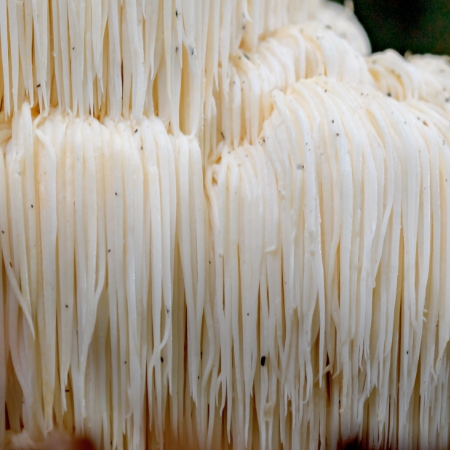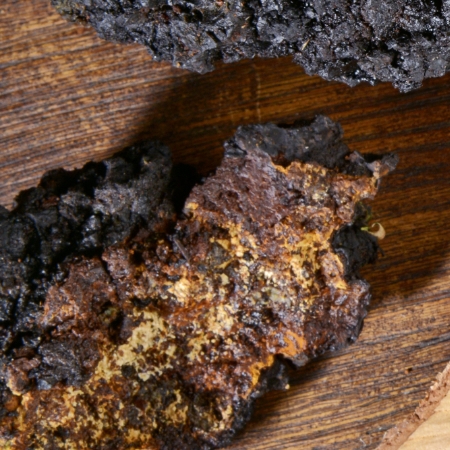After discovering the adaptogenic and nootropic qualities of certain mushroom species, you may wonder how to get the most out of them.
Lion’s Mane and Chaga are two popular mushrooms often taken for their health benefits. This may inevitably lead you to wonder if you can get more positive outcomes by taking both.
Before deciding on mixing Lion’s Mane and Chaga together, we need to explore the possible side effects and highlight some of the promising benefits of taking them together.
Contents
Lion’s Mane and Chaga: How Do They Work?
Functional mushrooms are a category of fungus species that is used as medicine to support a variety of different ailments.
Some offer both physical and mental benefits, but let’s focus on two in particular for their nootropic result, boosting immunity and healing.
Lion’s Mane Mushrooms
Lion’s Mane mushrooms, or Hericium Erinaceus, are a fungus variety that grows on hardwood trees native to Asian countries that taste like seafood.

This mycelial biomass is known for its fuzzy appearance and medicinal properties. In addition, it is a famous adaptogen with nootropic properties because of the contained alkaloids called hericenones.
Lion’s Mane supports cognitive functions by influencing nerve cell growth in the brain. This not only boosts mental clarity, but research shows it may be helpful in the treatment of Alzheimer’s disease and other forms of dementia (1).
In addition, it may provide an advantage for long-term cognitive health benefits that can prevent cognitive decline in otherwise healthy adults, particularly older adults.
It is known to improve mental health and reduce anxiety. This can make you feel happier, more productive, and decrease the risk of depression. Therefore, it may help to support restful sleep and prevent insomnia, excessive fatigue, and sleepiness (2).
Supplementation with extracts containing this variety of mushrooms also benefits overall health and the nervous system.
For example, it can boost immunity, lower blood sugar levels, reduce inflammation, build resilience to stress, lower cholesterol, and improve heart health (3).
Chaga Mushroom
The Chaga mushroom species grow in cold climates on birch trees and is often ground into organic mushroom powder as a tea or coffee substitute.

Chaga mushroom extract contains vanillins, offers qualities as a powerful adaptogen for balancing stress hormones and blood pressure, and helps to provide an abundant number of beneficial antioxidants.
Studies even show that the antioxidant benefits of functional food can work to prevent cancer by regulating healthy cells (4).
Furthermore, Chaga is great for the immune system and works numerous ways to promote other health benefits. It can even effectively reduce inflammation and lower bad cholesterol levels.
There is evidence that the mushroom bioactive substances could help repair muscle and tissue damage (5).
Is It Good To Combine Lion’s Mane With Chaga?
With many attractive benefits of these two mushroom species, it is natural to wonder if they work well together.
Some people believe that there are benefits to combining these two mushrooms, while others think they should be taken individually.
So, what is the verdict? Should you combine Lion’s Mane and Chaga, or take them separately?
Purpose and Benefits
Lion’s Mane and Chaga mushrooms can be combined in supplements or as an organic mushroom powder mixed into hot water or coffee.
The blend’s benefits are more profound than the results of either mushroom on its own, which can support the quality of life as a functional food.
Combining the antioxidant features and benefits to immunity of both mushrooms has a more substantial impact on physical vitality and the prevention of diseases.
They both work to fight against oxidative stress and offer natural anti-inflammatory qualities. Not only that, but both species of mushrooms also work together for a positive impact on cardiovascular fitness by lowering blood sugar and cholesterol.
One of the most common reasons people look for a blend of extracts that incorporate both types of mushrooms is mental health. While Chaga mushrooms build resilience to the harm stress can cause, Lion’s Mane aids in cognitive functioning.
Both varieties are consumed for medicinal uses to improve mood depression. Not only that, but they can also reduce anxiety symptoms in the body and mind.
Finally, other purposes for combining Chaga mushrooms with Lion’s Mane are to reduce brain fog, improve memory and concentration.
In addition, the benefits to cognition are natural, sustained, and long-lasting, which can provide a burst of energy and encourage clear thinking.
As a result, many people take both mushrooms for symptoms of cognitive decline, including memory loss and sluggishness, to retain their sharp perceptions and capabilities.
From our experience, users like to combine their mushrooms stack with coffee or other forms of caffeine as it helps with alertness and ward off the desire to sleep.
Dosage
Both mushroom types come in a few different forms to support health. The powder form can be taken plain but can taste bad, but it can easily be mixed into smoothies and other beverages.
Capsules are also available, easier to take, and more comfortable on the stomach because of a smaller, more concentrated dose.
While they can be taken as separate supplemental products, they are also blended into single products, making dosing convenient and more affordable in some cases.
Lion’s Mane doses are usually about 1000 mg each day, taken with food. The daily dose is usually divided into two or three doses of 250 to 500 mg. It is best to start with a small dose and then reevaluate how you feel after two weeks.
Chaga doses start at 500 mg, but many people require at least 1000 mg to support healthy outcomes. Some people take more up to 2000 mg per dose. However, the amount may decrease to 250 to 500 mg with an extract for equivalent results.
Some people find it is best to take a slightly smaller amount of each mushroom when they are taken together to reduce the likelihood of adverse reactions and because of the synergistic effects that have higher effectiveness with a lower amount.
Side Effects
Lion’s Mane and Chaga mushrooms are harmless for most people, but there is always a slight chance of negative reactions, which can increase with extracts’ potency.
Lion’s Mane mushroom on its own is very unlikely to cause side effects but may be contraindicated for those with bad allergies, as well as people with overactive immune functioning.
Other than that, the side effects of Lion’s Mane mushroom include headaches, nausea, and other gastrointestinal issues.
Some possible adverse actions caused by Chaga include nausea, fatigue or drowsiness, headaches, and changes in heart rate.
You should also avoid these mushrooms if you take prescription medications, have diabetes, are pregnant, have severe depression, are taking anticoagulants, or have an autoimmune disorder.
Should You Take Them Together?
Mixing Lion’s Mane and Chaga mushrooms can be a great way to enhance multiple aspects of your well-being.
When these two mushroom varieties are combined, the synergistic qualities will help support cognitive abilities and recall enough to combat excessive cognitive decline.
Not only that, but the combination can also help with immune support, cardiovascular health, mood, and more.

